Posted on September 28, 2023
AI Overviews (SGE) and Medical Queries – How Does Google Handle Them?
What is Google’s New Generative Search Experience?
AI Overviews (previously known as Search Generative Experience or SGE) is an experimental Google Search feature that uses AI to provide a new style of search results.
SGE understands search intent and generates comprehensive, real-time answers by using sourced text, images, and video in tailored results to users the very top of the page.
If you have played with any AI chat tools such as ChatGPT, Claude, or Bing Chat; SGE is a similar UI.
Though still experimental, many theorize (and some fear while others hope) SGE has the potential to completely change search and SEO as we know it.
While users have seen incremental changes to search engines over the past two decades through the additions of featured snippets, local map packs, and People Also Asked results, the release and forthcoming integration of SGE into search represents a paradigm shift beyond the traditional “10 blue links.”
Does SGE Answer Medical Based Queries?
When someone searches on Google or another search engine, they always have a goal or intention behind that search. Understanding those goals can help you make specific pages on your website easier to find and rank higher.
There are four main types of search goals to know about:
- Informational – The searcher wants to learn or research something. For example, “How much does LASIK Cost?“
- Navigational – The searcher wants to find a specific brand or person. For example, “WebMD” or “Joe Smith D.O.“
- Commercial – The searcher wants to pay for a service. For example, “Chiropractor Austin TX” or “Emergency vet near me.”
- Transactional – The searcher is ready to make a purchase right away. For example, “buy contact lenses.”
Knowing these search goals helps healthcare providers figure out what kind of content to create and the expected actions of users who visit those pages. Each type plays a role in effective medical website design and SEO strategies.
For the purposes of our experiment, we are going to test medical based queries for all four types of search intent.
Informational intent
Search: “Why does my ear keep ringing?”
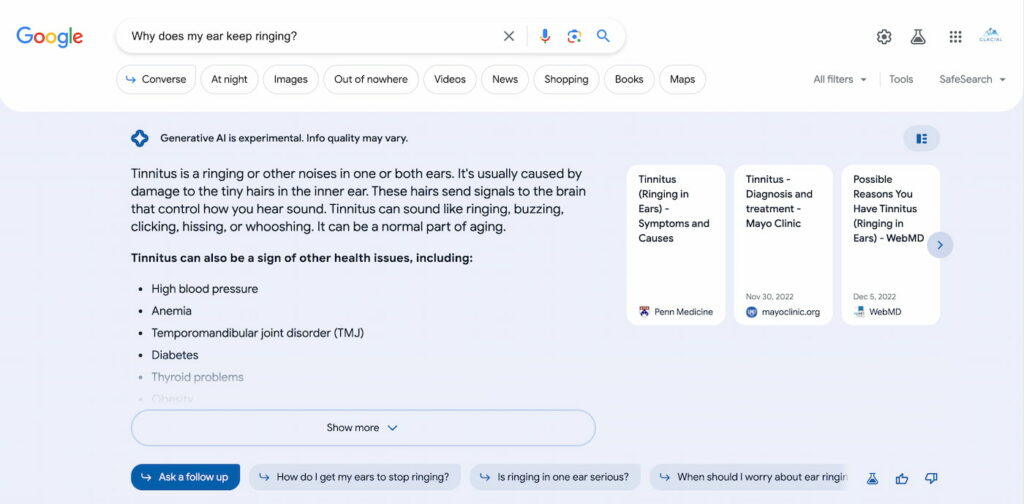
Search: “How much does LASIK Cost?”
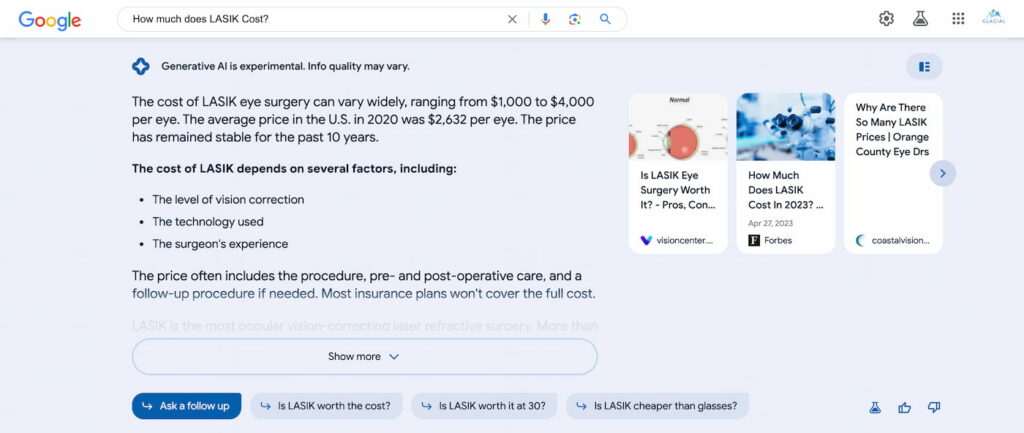
Navigational intent
Search: “Dr. David Chang Ophthalmologist”
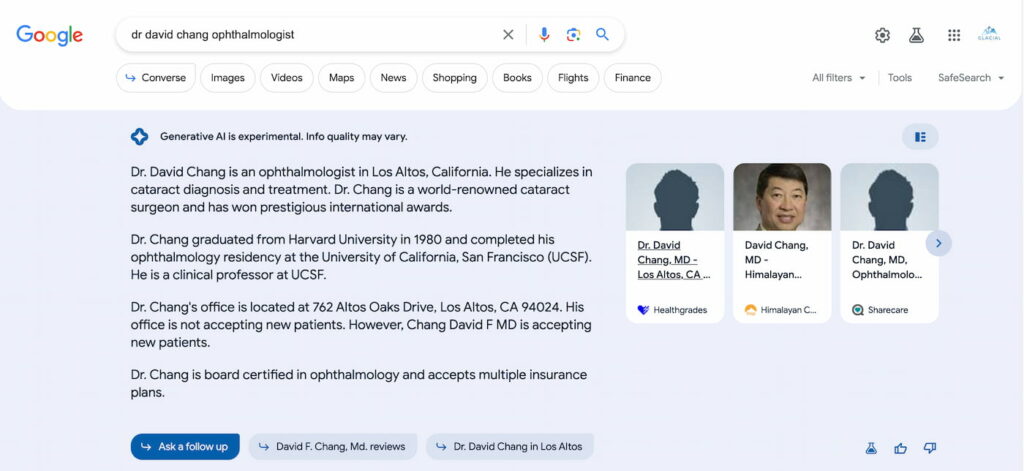
Transactional intent
Search: “Sleep apnea treatment Chicago”
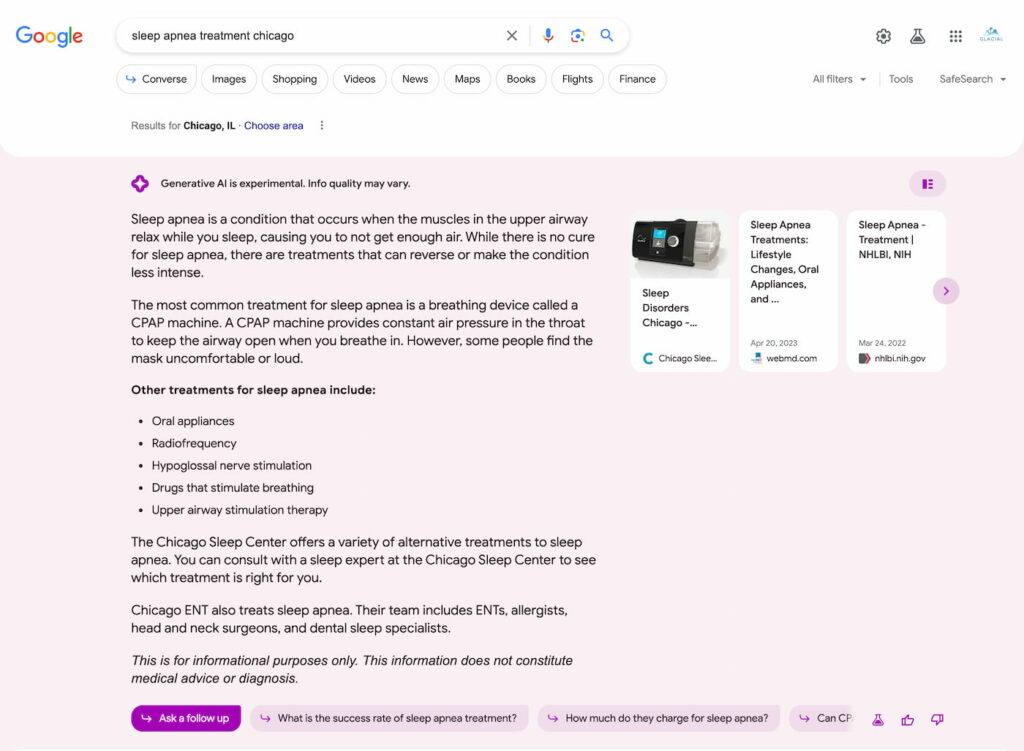
^ Sept 2023
Recent updates to AI overviews have changed how SGE displays results for local service based intent searches. The image above shows results in September 2023, while the image below shows updated results as of May 2024.
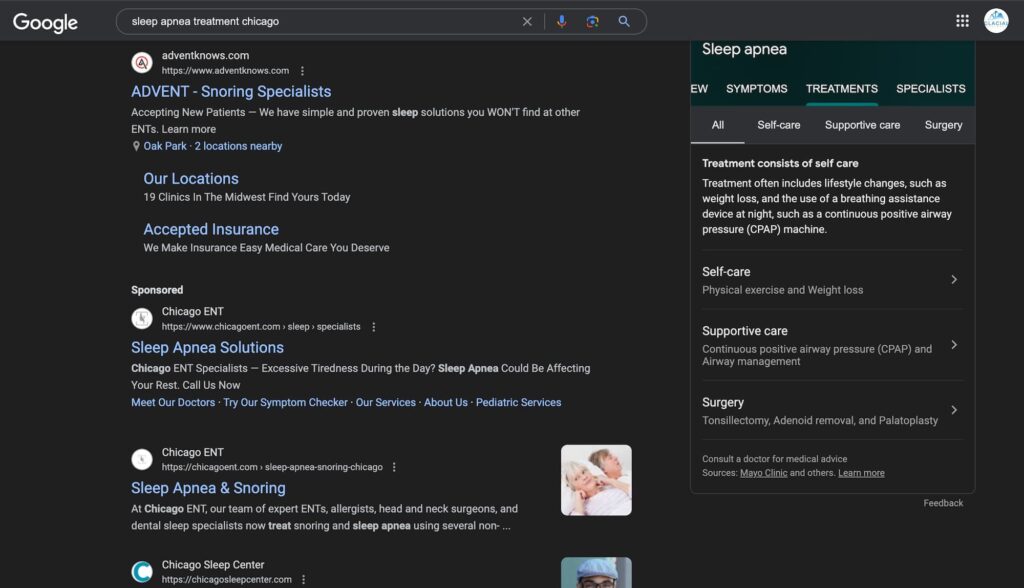
Results as of May 2023.
Commercial intent
Search: “where to buy eyeglasses in Portland ME”
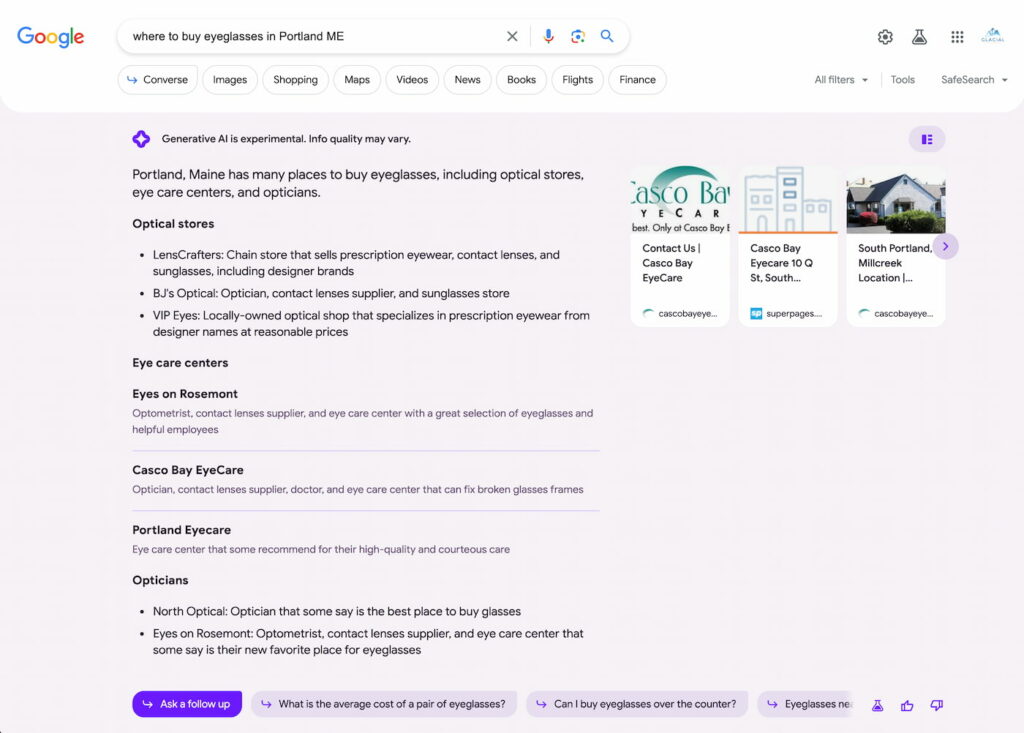
Search: “urologist dakota dunes south dakota”
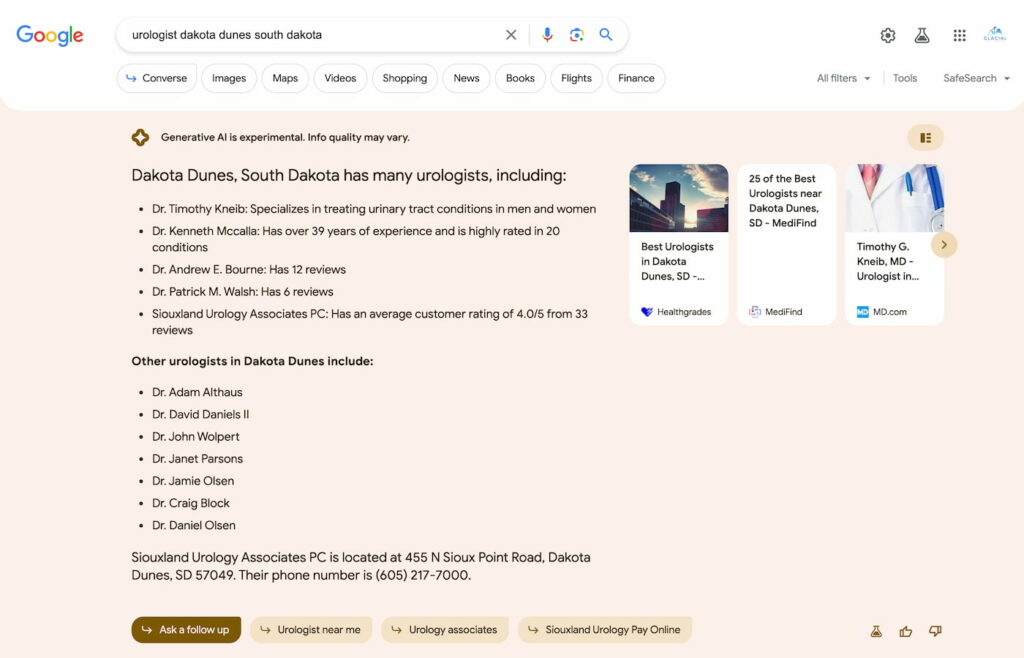
How does SGE currently impact Medical Related Searches?
As you can see from the various experiments, SGE results related to healthcare queries will appear around all four search intents when the results can largely be given as suggestions or purely informational.
But are there any types of medical related queries Google does not want SGE to answer?
Take this cheeky search for example. If you ask Google, “can I give myself an enema?“, SGE will provide an AI answer to the question, because your intent is informational.
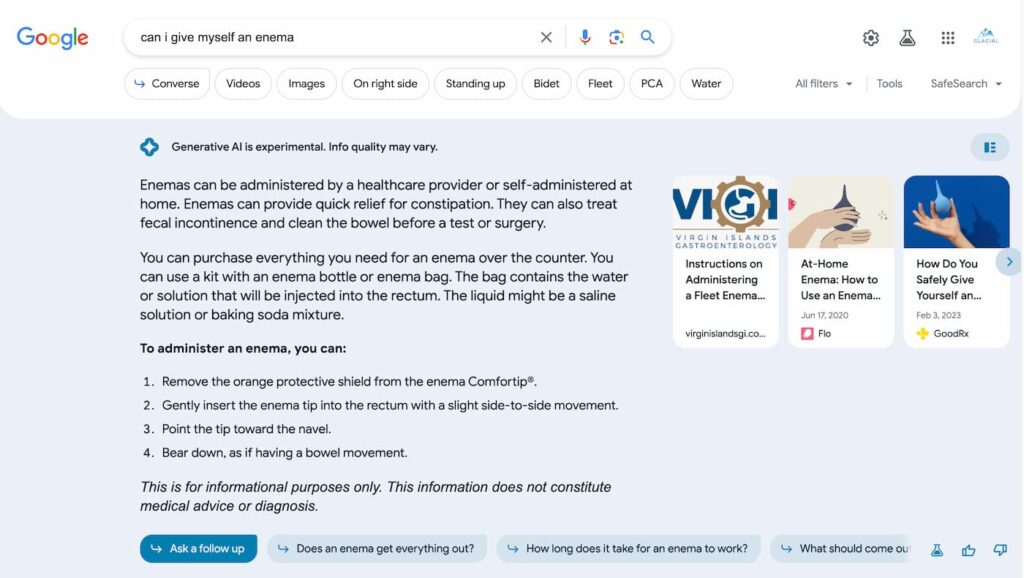
But if you change that query to “How to give myself an enema?” – Google SGE wants nothing to do with that and won’t even give you the option to manually generate an AI driven response. They’ll let other website handle answering that question.
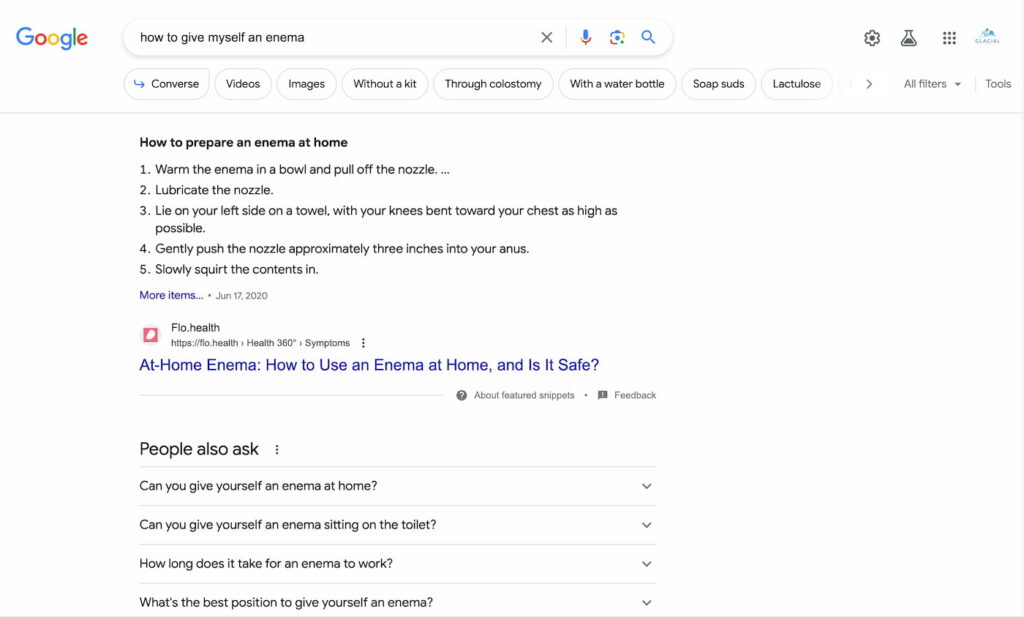
Understandably so. Google does not want to be even remotely responsible for any medical injuries that could somehow be tied to their AI’s direct instructions.
So while Google may currently allow SGE to present answers for research based queries, it does not present answers for healthcare search terms that would result in SGE providing direct instructions for how to do something.
What are the Main Things We Noticed About Medical SGE Queries?
- As of September 2023, SGE was not displaying ads in medical SGE queries.
- You’d expect ads to show for Navigational, Commercial, and maybe Transactional related search intent keywords at some point soon. Ads are where Google makes it’s money, and generating answers with an LLM is not cheap.
- Each keyword or question returned a side panel of three websites that acted as a carousel you could scroll sideways on to see more.
- The first three listed were not necessarily the first three blue links in the organic results. Google is making an effort with SGE to surface hidden gems of websites and make sure it’s answer encompasses a variety of perspectives and angles to the primary question.
- Every answer except the Navigational attempt returned a bullet point list along with the output.
- Google always prompted you at the bottom with multiple follow up question ideas in the form of buttons to click on and ask. Kind of like “People Also Asked” or “Related Searches” sections in the traditional organic results page.
- The commercial intent query results more closely mirrored the Google Map Pack results. Hinting that Local SEO and managing reviews, reputation and citations will continue to be more important.
How can Medical Websites Prepare for Search Generative Experience in the Future?
- Invest in a holistic SEO approach. That includes on-page and technical optimizations for your website, as well as link building and Local SEO components such as GMB profile management, review generation, accurate citations across the web and reputation management.
- Provide content on your website that addresses all four of the different search intents. Understand that some content is purely there for educational purposes and will see no conversions driven from it, while other page types will be your patient lead generators.
- Assume SGE will only become more popular. As younger generations come online, people become used to what they first encounter and for many, SGE will be the first search experience they know and seem like the standard way to interact with search.
